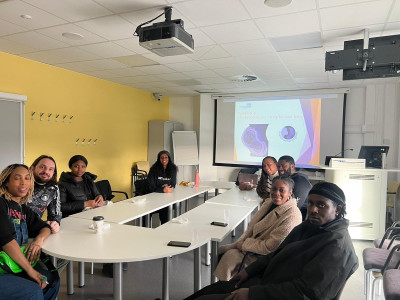
Midwives at the Royal Free London have developed a new programme designed to address inequalities in childbirth amongst black women and birthing people.
The ‘Safe in our Hands @ RFL’ programme provides tailored information and parent education aimed specifically at black and black-mixed heritage women and birthing people.
Currently there are disparities in the outcomes for women and birthing people from the global majority; black women and birthing people are four times more likely to die during pregnancy and they experience more stillbirths and neonatal deaths than their white and Asian counterparts.
What makes the programme unique is that it includes culturally specific information such as identifying jaundice in darker complexions, and signs of infection in a C-section wound and mastitis in darker complexions. Classes also cover informed choice and decision making, cultural practices and mental health scenarios.
“The tailored parent education classes have been developed to address the disparities highlighted by the ‘Mothers and Babies: Reducing Risk through Audits and Confidential Enquiries’ (MBRRACE) report in 2023 and are part of wider action aimed at reducing health inequalities,” said Libby Bell, consultant midwife and co-chair of the maternity equality, diversity and inclusion group.
"My predecessor Sumaayah Bilal, who is now the director of maternity & neonates - quality, service development and commissioning at North Central London, initially took the lead on implementing the classes in recognition of the need to address issues from the report."
“Women and birthing people from the global majority are at more risk of a number of conditions such as diabetes, so the classes contain information about health promotion and how to recognise when things aren’t right. For example, discussions around food are focused on those more commonly consumed by Afro-Caribbean women and birthing people.”
The classes are delivered over three weeks every two months, with 15 couples being offered places – 10 at Chase Farm Hospital and five at Edgware Birth Centre.
“The classes are all taught by black midwives, which makes it more relatable,” said Hollie Williams, equity and equality specialist midwife. “The idea is to create a safe space and build up a community to discuss any fears or negative experiences they may have had.”
Separate to the classes, staff also undergo a better births mandatory training day which covers much of the same information, enabling them to better support pregnant women and birthing people through pregnancy, birth and postnatal care.
Natasha Mason, clinical practice facilitator, is one of the midwives who helped create the programme and regular delivers the classes.
“It’s a privilege to be able to provide tailored information to women and birthing people that are coming into a service feeling vulnerable,” she said. “I support them and hope they feel more empowered to make the choices that are right for them.”
“In view of the statistics that are out there concerning black women and birthing people’s health, it is important to make them feel valued and heard to reduce any fears that they have.”
Natalie Anim-Addo took part in the classes and said they “provided a safe and welcoming space for open discussions and shared experiences".
“I learned invaluable information that left me feeling better prepared for caring for my newborn, navigating labour, and making the most of my pregnancy. I would highly recommend these classes to anyone considering them.”
Libby says the team plan to expand the programme to offer additional tailored classes for Asian women, who also suffer poorer outcomes during pregnancy and birth.
“It is important that we do our part to create an equitable service and improve outcomes for all,” she said.
 Translate
Translate